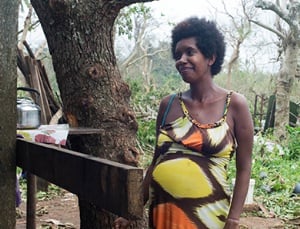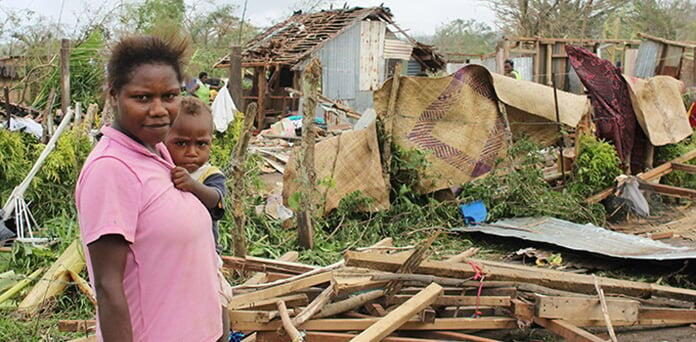SUVA, Fiji/UNITED NATIONS, Bangkok – Four days after Cyclone Pam cut a path of destruction across Vanuatu, the full scale of the devastation has yet to be determined. The Category Five storm damaged an estimated 90 per cent of structures on the main island of Efate, and Shefa Province has declared a state of emergency. Some 3,300 people are sheltering in 37 evacuation centres, and 11 people have been confirmed dead. UNFPA estimates some 6,700 women in the country are pregnant and in need of maternal care services.
There are about 56,000 women and girls of childbearing age in Vanuatu, according to the country’s 2013 Demographic Health Survey. These women and girls will require reproductive health services, hygiene supplies and other support.

Extensive damage
Of the women estimated to be pregnant, 100 are projected to experience dangerous complications in the coming month, and 900 will face complications in the next nine months.
But medical facilities have sustained heavy damage, United Nations officials report.
“The Vila Central Hospital requires urgent repairs,” said UNFPA Programme Analyst Gideon Mael from Port-Vila, the capital.
The hospital continues to function “despite extensive damage,” but medical supplies and additional wards are needed.
Emergency response
UNFPA has provided radios and dignity kits, which contain hygiene supplies and other essential materials for women and girls of reproductive age. The Fund is also providing emergency reproductive health supplies, including kits for safe delivery and management of miscarriage.
Working closely with the Ministry of Health and UN humanitarian coordinators, UNFPA is performing a needs assessment to determine the full extent of the response required.
Protection services may also be required, as crisis conditions often exacerbate the vulnerability of women and girls to abuse and exploitation.




